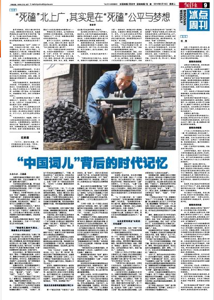“Are you optimistic or pessimistic about China’s media?” I’ve answered this question for more than ten years now. I’ve answered with optimism. I’ve answered with pessimism. And it’s gotten to the point where I’m sometimes confused myself about what to say or what to feel.
Perhaps it’s better then to get back to concrete analysis and avoid simplistic pronouncements. Earlier this year, Ying Chan, the head of our center, wrote a piece for FT Chinese called, “Chinese Media: Avoiding Pessimism and Returning to Professionalism,” in which she listed out a number of important stories Chinese media had managed to report despite facing a horrific environment.
I agree with Professor Chan’s approach, that we should be mindful of encouraging efforts even as we recognise discouraging setbacks. And I’ve been delighted recently to discover another positive case in point, a documentary series called Chinese Words.
I’ve written before about my own flesh-and-blood experiences with political language, for example with the notion of a “red heart,” from my youthful days as a reporter in the People’s Liberation Army all the way through to the economic reform era. Now a group of my friends and colleagues are speaking on camera about 100 “Chinese words” — terms like zheng shen (政审), or “examination of one’s political record,” and jiating chushen (家庭出身), meaning someone’s “political pedigree” (were you a worker or one of the “five red types,” or a capitalist or one of the “five black types”?). An examination of these terms, so important to China’s recent political and cultural past, provides the substance of Chinese Words.
Many intellectuals in China have welcomed this examination with open arms. “These Chinese words,” said the scholar Zhang Ming, “are words that hold our blood and our tears.” The writer Hu Fayun said: “Chinese words are words particular to China, they are words that reveal how China’s unique character came to be.” Clearly, this documentary series is an opportunity to reflect back on our history and admonish many aspects of our present political and social circumstances.
In our current media environment, characterised by intensified control, this sort of media undertaking is a real rarity. And in it we can see a group of journalists at work who aren’t pessimistic — who in fact are seizing every opportunity.
Chinese Words was created in a very unique way as well, with content provided by the public and financing coming from the public. The 100 “Chinese words” were gathered through social media, and 3,000 citizens donated 100 yuan each to the project through the crowd-financing site “Zhong Shou Wang” (众筹网) , giving it a total budget of 300,000 yuan. The project even drew attention from other media, and China Youth Daily‘s “Freezing Point” supplement did a feature story on it.

Following the “Freezing Point” incident eight years ago, I wrote about what I call the “Three C’s” (Control, Change, Chaos), which describe the state of China’s media. While traditional controls on media continue, and have even strengthened, commercialisation of the media and the development of new digital platforms have also brought change. The resulting state of chaos in China’s media has generated opportunities for journalists.
With the emergence of Chinese Words we see the further development of this state of affairs. While traditional media face a crisis caused by the intersection of tightening controls and new media competitors, journalists in China are exploring new ways to work.
The creators of Chinese Words are all editors formerly from print media. In fact, they launched a very good magazine called China History (whose name was later changed to Views on History). However, facing constant pressures both commercially and politically, the original team pulled out one by one. They have every reason to be pessimistic, but they’ve chosen instead to pull themselves together and do something new. They’ve now created a new media production platform for history related content — the New History Cooperative (新历史合作社). Their products — including books, magazines, events and videos — are shared through the internet and through WeChat and Weibo.
The fate of Chinese media is not in the hands of control alone. The fight for space for media to exist and thrive requires brave action like that of citizens during last year’s Southern Weekly incident, but also efforts like that at the New History Cooperative that seek to find opportunity in the midst of crisis.
There are journalists in China who are endeavouring to find paths of survival in a complex environment at the intersection of power, the market and technology. New and unprecedented types of communication, financing and profit, and even new media frameworks, are emerging like fresh green shoots.
We cannot expect power to yield its control anytime soon, but the strength of society is growing daily, and the creative spirit of the media has not been crushed. I see the strength of this creative spirit in the Chinese Words project.




















